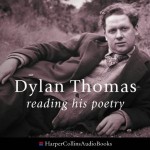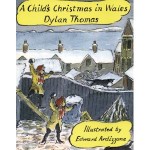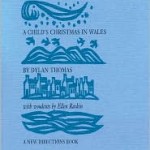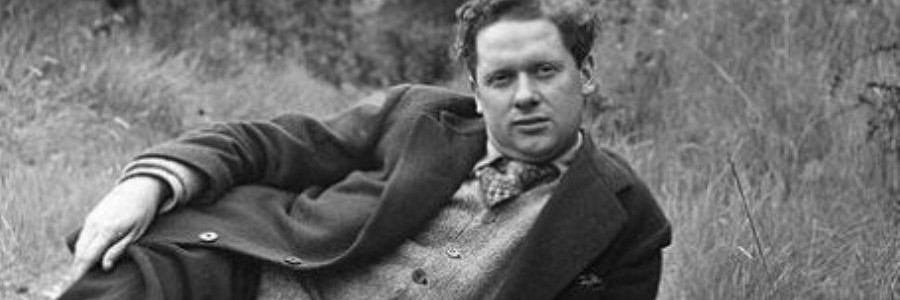I suspect every family has a list of Yuletide must-see TV such as “Rudolph The Red-Nosed Reindeer,” “How The Grinch Stole Christmas,” “Mr. Magoo’s Christmas Carol, ” “A Christmas Story” or “Elf,” but are literary works included in your Most Wonderful Time of the Year-read canon? As for me and my house, “A Child’s Christmas in Wales,” by Dylan Thomas, always makes the cut. 
What was originally conceived as a fireside chat for the BBC’s Welsh Children’s Hour in 1945, and first published in Harper’s Bazaar, soon became a beloved, popular hymn to childhood Christmases, widely available on vinyl and in print. There are now a vareity of editions to suit the reader, featuring the idyllic illustrations of Edward Ardizzone, the woodcuts of Ellen Raskin, or the rough drawings of Trina Schart Hyman.
“A Child’s Christmas in Wales” is not a poem or story, but a stream of consciousness, mytho-comedic reverie. It’s Joycean-Thurberesque prosetry, but with a Welsh accent. Here, I’ll entice you with my favorite scenes.
While waiting to ambush neighborhood cats with snowballs on December 24th, pretending to be fur-capped, moccasined trappers from Hudson Bay, young Dylan and friends are interrupted by a call to real life adventure.
 “Fire!” cried Mrs. Prothero, and she beat the dinner-gong.
“Fire!” cried Mrs. Prothero, and she beat the dinner-gong.
And we ran down the garden, with the snowballs in our arms, toward the house; and smoke, indeed, was pouring out of the dining-room, and the gong was bombilating, and Mrs. Prothero was announcing ruin like a town crier in Pompeii. This was better than all the cats in Wales standing on the wall in a row. We bounded into the house, laden with snowballs, and stopped at the open door of the smoke-filled room.
The boys then encounter Mr. Prothero, standing in the middle of the room, swatting at the smoke with a bedroom slipper.
There was no fire to be seen, only clouds of smoke and Mr. Prothero standing in the middle of them, waving his slipper as though he were conducting.
“Do something,” he said. And we threw all our snowballs into the smoke . . ..
Soon the fire brigade arrives.
. . . [t]hree tall men in helmets brought a hose into the house and Mr. Prothero got out just in time before they turned it on. Nobody could have had a noisier Christmas Eve. And when the firemen turned off the hose and were standing in the wet, smoky room, Jim’s Aunt, Miss Prothero, came downstairs and peered in at them. Jim and I waited, very quietly, to hear what she would say to them. She said the right thing, always. She looked at the three tall firemen in their shining helmets, standing among the smoke and cinders and dissolving snowballs, and she said, “Would you like anything to read?”
By the end of Thomas’ narrative daydream, the boys hear ghost stories, a neglected Christmas tradition, and go caroling.
And I remember that we went singing carols once, when there wasn’t the shaving of a moon to light the flying streets. At the end of a long road was a drive that led to a large house, and we stumbled up the darkness of the drive that night, each one of us afraid, each one holding a stone in his hand in case, and all of us too brave to say a word.
After debating which song they would sing, they reach a compromise on “Good King Wenceslas.”
“I’ll count three.” One, two three, and we began to sing, our voices high and seemingly distant in the snow-felted darkness round the house that was occupied by nobody we knew. We stood close together, near the dark door. “Good King Wenceslas looked out On the Feast of Stephen …”
And then a small, dry voice, like the voice of someone who has not spoken for a long time, joined our singing: a small, dry, eggshell voice from the other side of the door: a small dry voice through the keyhole. And when we stopped running we were outside our house . . .. “
Exhausted from these remembered festivities, the young Dylan retires.
 Looking through my bedroom window, out into the moonlight and the unending smoke-colored snow, I could see the lights in the windows of all the other houses on our hill and hear the music rising from them up the long, steady falling night. I turned the gas down, I got into bed. I said some words to the close and holy darkness, and then I slept.
Looking through my bedroom window, out into the moonlight and the unending smoke-colored snow, I could see the lights in the windows of all the other houses on our hill and hear the music rising from them up the long, steady falling night. I turned the gas down, I got into bed. I said some words to the close and holy darkness, and then I slept.
If this season you are searching for some words to say to the “close and holy darkness,” I know of no better way to go gentle into the good night of Christmas Eve than to recite “A Child’s Christmas in Wales” with sons and daughters near a flickering hearth. Since I believe in an open canon of Christmas literature, what other candidates would you propose I entertain?
;

I love this. All my children have Welsh names, and we are enamored by the history and culture of Wales. I’ll have to check this one out!
Kamisaki, if you like Van Morrison, I’m pretty sure his “spoken song” “Hynford Street” on the Hymns to the Silence album is modeled after this.
I had forgotten about this book! (I’ve never read it, it had just been added to the running list in my head.) I’ve added it to my reservations at the library, reading it aloud sounds like the perfect antidote to the hectic pace we’ve been keeping. I’ll return and report.
Going to see if I can get it on my kindle!!! Thanks Ed.
We often read A Christmas Carol on Christmas Eve. Dickens is as Holy as scripture, it seems.
Brent tried reading A Christmas Carol to the kids this year and they revolted. The only made it one night or two before starting another book. The language was just too hard for Stuart. Maybe next year??
Christmas Carol is a lot of dense, Victorian-era prose. The thing about Dylan Thomas’ prose poem is that it is entertaining and beautifully written, with a lot of poetic turns that just sound great read out loud.